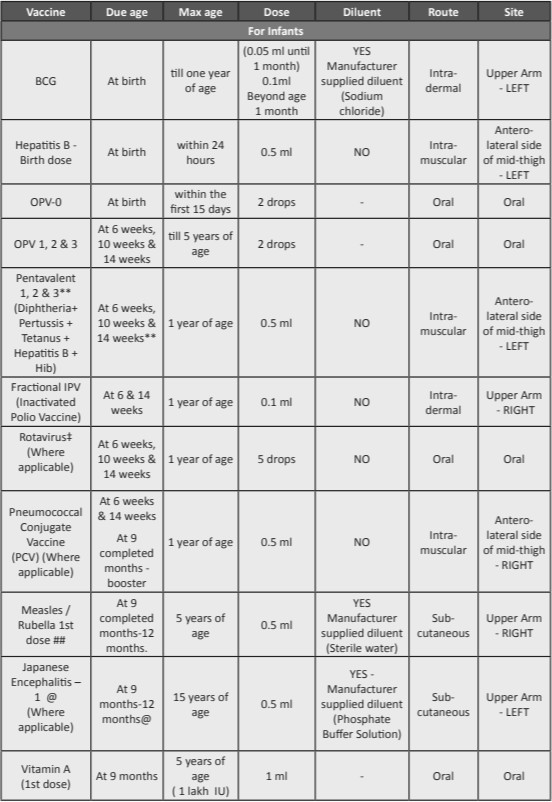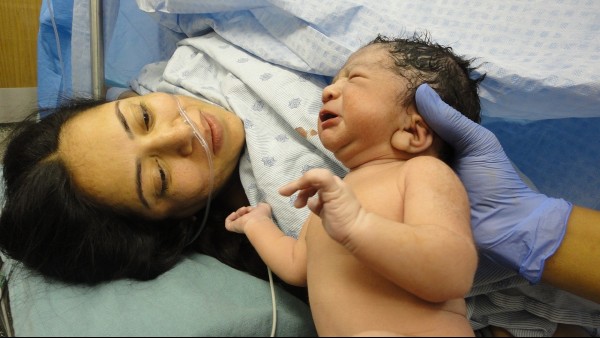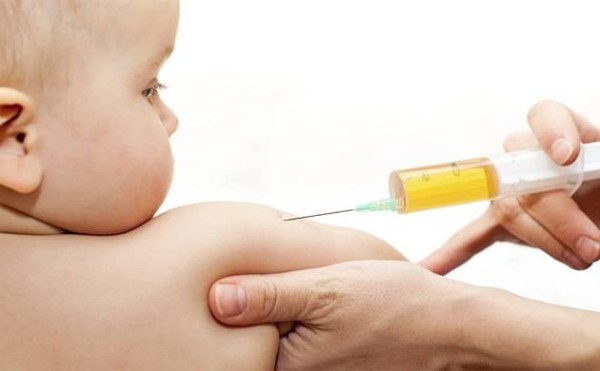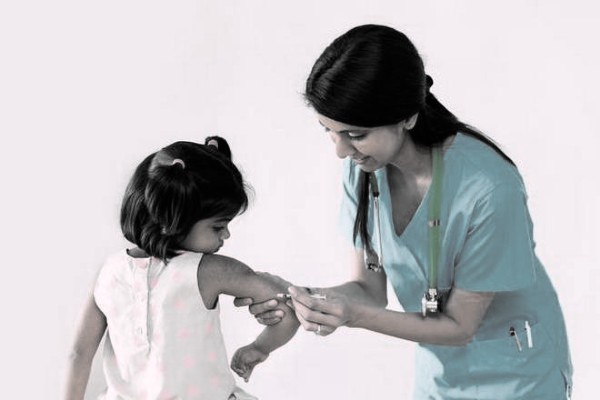Can I Get My Baby 18 Montha Vaccines Kn India
Childhood is a catamenia of learning the ways of life, for parents and children alike. Health of young children is more vulnerable in comparison to adults. This happens because they have not developed a potent immunity yet. This makes them more likely to fall ill with allergies, infections etc.
Illness stimulates the immune system to develop a healthy defence against various harmful influences. However, this does not imply that diseases should be allowed to run rampant. It is necessary to protect young children from developing disorders which could compromise their health on a permanent basis. Defending their health from harmful disorders is almost of import. The first stride towards this is providing proper vaccination to babies right from birth.
The National Immunization Schedule is a venture initiated by the health ministry. This schedule provides a detailed chart of all vaccinations required from birth till the age of 18 years. The name of vaccine, diseases information technology helps to fight against, style of assistants and the age at which each vaccine should be administered, are some details mentioned in this chart. Timely vaccination is i of the best means to develop a strong immunity.
Several vaccines are administered to children from nascence till the age of 18 years. These vaccines have to exist given at a specific age but, to have the desired outcome on the child's immune arrangement. Given below are details of all vaccines included in the National Immunization Schedule. This schedule is approved by Health Ministry of Bharat. All vaccines mentioned in the schedule are mandatory as per regulations of the Health Ministry.
- At Birth
The first vaccine to be given soon after birth is B.C.G (Bacillus-Calmette Guerin). Information technology acts as a protective shield against the mortiferous tuberculosis infection. Calmette and Guerin are the names of scientists who developed this vaccine. It is injected into the skin of the left forearm on the outer side just. It is advisable to administrate BCG inside the get-go few hours of the child's birth.

Forth with BCG injection, the beginning oral dose of polio vaccine and first injection of Hepatitis B, are as well administered at birth. Hepatitis B injection is administered on the muscles of thigh only and at no other site. Local swelling and redness at the site of injection is the most common complication of both the injectable vaccines. These symptoms subside within no fourth dimension.
- 6 weeks of Age
The 2nd vaccination afterward B.C.One thousand, polio dose, and hepatitis B injection, is given at 6 weeks of age. The first dose of injectable pentavalent vaccine is given when the baby turns half-dozen weeks one-time / 1 and a half months sometime. The v diseases against which this vaccine offers protection include Diphtheria, Whooping Cough, Tetanus, Hepatitis B, and Flu.
All of these are infectious disorders caused by deadly virus and bacteria. Except Hepatitis B and Tetanus, the other three disorders are highly contagious. Their contagious nature makes is difficult to contain them and therefore, it is of import to vaccinate infants against these diseases.
The first dose of injectable polio vaccine is also given along with pentavalent vaccine. It is mandatory to administer Pentavalent and Polio vaccines to all children once they plow half dozen weeks old. In some States of Bharat, it is also mandatory to administer rotavirus vaccine. This vaccine offers protection against viral diarrhoea which can accept a strenuous upshot on the infant'southward health.
- ten weeks of Historic period
A dose of pentavalent vaccine is repeated before the child turns iii months old. This is known as a booster dose as it enhances the effect of a vaccine which has been previously administered. Infants who have received the first dose of rotavirus vaccine, need to be given a booster dose for the aforementioned.
- 14 weeks of Age
Once the babe turns 3 months one-time, another dose of Pentavalent vaccine is given. 2nd booster dose of rotavirus is given along with Pentavalent vaccine to those children who have received previous doses. The first booster dose of injectable polio vaccine is mentioned in the immunization schedule at the age of xiv weeks.
Most injectable vaccines lead to swelling and pain at the site of injection. Children may suffer from temporary discomfort due to this. However, these symptoms subside with time and practice not crusade any long lasting health issues.
- nine-12 months of Age
Children are given vaccination confronting infections similar, Measles, Mumps, Rubella and Japanese Encephalitis for the outset fourth dimension when they are nearing one year of age. Both vaccinations are administered in the grade of subcutaneous injections. Japanese encephalitis is mandatory only in regions where the condition is owned.

Children of this age group are given the get-go oral dose of Vitamin A in club to avoid deficiency of this particular food. Despite this supplement, parents should ensure that they include foods rich in Vitamin A in their children's diet. Consuming foods that are naturally rich in Vitamin A, is a improve way of avoiding Vitamin A deficiency.
Past the time a kid turns i twelvemonth old, he/she has been administered with all the vaccines mentioned in the national immunization schedule at least once. From 1 year of historic period till 18 years of historic period, repeated doses of these vaccines are administered. They serve as booster doses which raise the action of previously given doses of the same vaccine. Booster doses of Japanese Encephalitis vaccine are given only to those children who have been given the first dose of the vaccine.
- sixteen-24 months
three out of the five vaccines included in the pentavalent vaccine are repeated earlier the kid turns 2 years old. These vaccines are combined into a single injectable dose known as D.P.T (Diphtheria, Pertussis, Tetanus). It is an intramuscular injection administered into the thigh. Some toddlers may experience fever, pain and discomfort after the vaccine.
A booster dose of oral polio vaccine is also given to children of this age group. Some other booster dose administered during this period includes injectable vaccine of Grand.M.R (Mumps, Measles, Rubella). Children staying in endemic regions are also vaccinated against Japanese Encephalitis.
The outset booster dose of Vitamin A is to be given orally before the child turns 2 years one-time. Along with this oral dose, children should also receive a healthy nutrition that is rich in Vitamin A.
- 2-5 years of historic period
From the age of 2-v years, children are to be administered with booster doses of Vitamin A supplement. The dose is administered every half dozen months in oral form.
Vaccination continues till the age of 18 years. Information technology primarily comprises of booster doses of tetanus vaccine, diphtheria vaccine and measles vaccine. Due to advancement in medical research, newer vaccines are tested and introduced into the market every year. Teenage females can now be vaccinated during their childhood so that they practice non go afflicted with life threatening infections like measles later during their pregnancy.

Many people argue that children should be allowed to develop their immunity naturally without vaccinating them. While this is truthful to some extent, one merely cannot hazard exposing infants and young children to infections equally serious equally Japanese Encephalitis or measles. Simple viral flu, seasonal cold and cough, do non require vaccination and in fact help children in building a healthier immunity. However, the same cannot be said about infections that can take fatal event.
A fence on pros and cons of vaccination has stirred up a lot of controversies lately. While some parents adopt to stick to the old schoolhouse ideology of vaccinating their children, some parents have started taking the 'no vaccination' approach. There is adequate research to support the usefulness of vaccinating children. However, inquiry on the disadvantages of vaccination is still in a nascent phase. Therefore, not much tangible proof exists on the agin effects of vaccination.
It is unwise to reach a determination of vaccinating or not vaccinating young children without consulting with a pediatrician.
longoriabutia1939.blogspot.com
Source: https://www.medifee.com/blog/vaccination-chart-for-babies-in-india/
0 Response to "Can I Get My Baby 18 Montha Vaccines Kn India"
Publicar un comentario